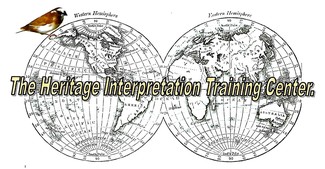John Veverka & Associates
Main menu
- Home Page
- Our Range of Services
- Separator 2
- Interpretive Coaching
- Interpretive Planning
- Interpretive Plan Outline
- Interpretive Training
- John Veverka Resume
- Qualifications
- NEW Advanced Interp. Text Book
- Separator 11
- InterpNEWS
- Separator 12
- Library
- Expert in Interpretation
- JVA NEWS, Courses and Updates
- Certificates
- Separator 47
- Planning/Design of Interpretive Panels
- Separator 48
- Interpretive Writing
- Separator 49
- Interpretive Writing Course
- Separator 50
- Interpretive Trails Course
- Separator 56
- Interpretive Panels Course
- Separator 55
- Introduction to Heritage Interpretation Course
- Separator 54
- Interpretive Planning & Design of Marketing Brochures Course
- Training for Interp. Trainers
- Separator 57
- Interpretive Exhibits Course
- Separator 58
- Interpretive Master Planning Course
- Separator 59
- Interpretive Planning for Scenic Byways.
- Critiquing and Coaching Interpretive Staff
- Separator 31
- Advanced Interpretive Planning
- Interpretive Training Center Course Catalogue
- Separator 32
- Interp. for International Visitors course.
- Separator 33
- Interpretive Exhibits Evaluation
- Separator 34
- Interp. Center Feasibility Analysis Course.
- Separator 35
- Interp. for Commercial Tour Providers
- Separator 36
- Interpretive Researchers Guide for Visitor Studies
- Separator 37
- Separator 13
- Interp. Planning for Historic Homes
- Separator 14
- Heritage Interpretation Training Center
- Interpretive Planning for Botanical Gardens
- Separator 15
- An introduction to planning and presenting live interpretive programs and tours for Museum/Heritage Site Docents and Volunteers.
- Developing Marketing Plans for Heritage & Tourism Sites and Attractions
- Separator 16
- Interpretation Book Store
- Separator 17
- Heritage Interpretation Resource Center
- Interpretive Planning for Historic Farms
- Developing Successful Partnerships
- Developing Interpretive Outreach Programs
- Community Interpretation Planning
- Interpreting Gravestones and Historic Cemeteries
- Using Interpretation to Accomplish Management Objectives.
- An Interpreters Guide for Survival Economics.
- Separator 18
- Innovative Strategies for Interpretive Media and Services Planning.
- Separator 19
- A Curators Guide for Developing Gallery Tours.
- Advanced Interpretive Writing - Technical Publications
- Page 2
- Advanced Interpretive Services for Managers, Supervisors, Team Leaders and Sr. Staff.
- Separator 20
- Advanced Interpretation for Chiefs of Interp. - Interpretive Managers - Regional Interp. Specialists
- Interpreting Critical Issues.
- Separator 21
- Developing Commercial Interpretation for Resorts, Cruise Ships, Campgrounds and Tourism Attractions.
- Separator 38
- Planning and developing a new commercial tour guiding business.
- Separator 39
- Interpretive Evaluation, Visitor Studies and Site Assessment Center
- Separator 40
- The Center for Interpretive Planning Advancement & Excellence.
- Developing Requests for Proposals (RFPs)
- Separator 41
- Planning and Facilitating Focus Workshops
- Separator 42
- InterpNEWS Advertising Details
- Planning for Interpretive Experiences
- 40 Years a Heritage Interpreter
- Separator 43
- Interpretive Techniques - The Rest of the Story Course
- Separator 44
- Certified Professional Interpretive Planner Certificate
- Certified Professional Interpretive Program
- Certified Professional Interpretive Trainer certificate program.
- Separator 53
- Certified Professional Heritage Interpreter certificate program.
- Separator 52
- Certified Professional Interpretive Writer certificate program.
- Visitor motives for attending interpretive programs.
- Separator 45
- Exhibit Rehab Course
- Separator 46
- Developing Training Workbooks & Manuals
- Separator 22
- Planning for Railroad Museums and Sites.
- Separator 51
- Climate Change Interpretation Course.
- Separator 23
- When there's nothing left but the story - interp. storytelling.
- Separator 24
- Interpreting Legends Myths and Fables
- Separator 25
- InterpSHARE - Seminars 2022
- Separator 26
- Interpreting Invasive Species
- Separator 27
- Interpretiing Edible Insects
- Separator 28
- Interpretaive Planning for Climate Change
- Separator 29
- HITC Climate Crisis Resource Center
- Separator 30
- Separator 5
- PUP Members Only
- Starting a new Interp Consulting Business
- Panels 4 Week Course
- Separator 8
- Interpretive Writing - 4 Week Course
- Marketing - 4 Week Course
- Separator 7
- Intro to Interpretation - 4 Week Course
- Separator 9
- Interp Climate Change - 4 Week Course
- Separator 10
- Exhibit Rehab 4-Week Course
- Separator 6
- Level 1
- Johns Interpreters Blog
- Separator 4
- Economics for Heritage Interpreters
Planning and developing a new commercial tour guiding business.

Planning and developing a new commercial tour guiding business.
This course is designed to help folks who want to start an
interpretive tour guiding business get a focused and good business planning start.
17 Units, 3 CEU Credits
Course Tuition - $500.00
Over the past few years there has been a huge increase in the number of people who have an interest in starting their own interpretive tour guiding business. Many of those are folks involved in heritage interpretation in some way who have or are going to retire from their current position, and feel that being a professional tourist guide would be something they would both enjoy and find a great deal of personal satisfaction in sharing their love of history or nature with visitors. Others are folks whose positions in museums, parks or heritage sites have been eliminated and see the tourist sector as a good career move and one that will provide them with personal satisfaction as well as a paycheck.
Having been there - 40 years ago - I can tell you that it looks easy to do - but it's not. So don't give up your day job just yet - if you have one. You have some work to do first, and this course will help you plan and develop a great tour guiding business with a reality check in tow.
As a e-LIVE course, you'll be able to talk with the course instructor as needed to be your coach throughout the course and provide you with support as you get your business growing.
You can start the course any time and complete the course at your own pace.
About the Instructor: Prof. John Veverka
- B.S and M.S in Heritage Interpretation - The Ohio State University (Taught a course on
Interpretive Master Planning - wrote the first Interpretive Planning Text book).
- Ph.D. program in Interpretation at Michigan State University. (Taught introduction and
advanced interpretive courses including interpretive planning units.)
- Adjunct Professor Heritage Interpretation (summer heritage tourism institutes) North
Carolina State University, New York State University.
- NAI Certified Interpretive Planner and Trainer
- NAI Fellow
- Certified Professional Heritage Interpreter (Canada).
- Author of several interpretive planning/training college text books.
- Publisher of InterpNEWS - the International Heritage Interpretation e-Magazine.
- 40 years of interpretive planning, training and writing experience.
- Senior Instructor, Kansas State University - Global Campus (Interpretive Planning).
Course Units:
Unit One - Why? What are your reasons, motivations and goals for starting a new tour guiding
business?
Unit Two - Make a list and check it twice. Meaning - let's make a check list of everything you are going to need to do to go from - this is what I want - to having your business developed and operational.
Unit Three - The legal stuff - assumed name certificate, tax ID number, banking account, payment options, licenses if any, insurance for any liability issues, etc.
Unit Four - Tour business operational time frames. Are you full time, year round, just summer, or by appointment?
Unit Five - Financial analysis - how much will your start-up cost, what will each tour event cost, how much profit do you need to make per tour and over time. Overhead vs. tour fee.
Unit Six - Geography and scope - Where do you plan to operate - do your tours - local, regional, or beyond.
Unit Seven - the tour delivery options - walking tours, van tours, bicycle tours, boat tours?
Unit Eight - Tour durations and logistics. Tour group meeting point or pick-ups, meals or snacks, bathroom stops, first aide, tour lengths, starting and ending times.
Unit Nine - Tour stop partners? Will you have an arrangement with other attractions for reduced admission, or at a coffee shop or gift store stop on the tour for reduced costs? What's the plan for partnerships?
Unit Ten - Developing your tour story, interpretive theme and tour stop (i.e. your tour interpretive plan). Audience profiles, knowledge levels, tour expectations. Tour experience
development and inventory.
Unit Eleven - The importance of souvenirs and photo opportunities - plan for both.
Unit Twelve - Your tour supplies. What do you need to take with you on your tour - teaching aides, historic photos, video, music, binoculars, etc.
Unit Thirteen - Tour dry runs for timing, logistics, tour group placement (where they will stand) during tour stops, etc. A one or two hour tour (as advertised) should actually take the time advertised.
Unit Fourteen - Developing your tour business web site and marketing plan. Can they sign up and pay at your web site (via pay pal, etc.) Does your web site have video from past tours or testimonials from past tour participants?
Unit Fifteen - Your marketing and advertising plan basics.
Unit Sixteen - Developing your tour introductions and conclusions. Post tour marketing and handouts.
Unit Seventeen - Keeping your records (contact lists, supply and related receipts, e-mail lists and related records). And now you're ready to go. Good luck and stay in touch.
If you would like more details on this course please feel free to contact me. If you would like to enroll in this course, first contact me for a Registration Form. Then you can return to this page, click on the Pay Now button below, and off we go to get you started. Course tuition is: $500.00 USD. This course provides a lot of one-on-one coaching and advice.
Cheers,
Prof. John Veverka
jvainterp@aol.com
SKYPE: jvaintep